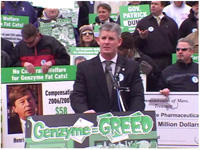Wyeth = Greed
WYETH
Five Giralda Farms
Madison, New Jersey 07940
(973) 660-5000
www.wyeth.com
Chairman: Robert Essner
Chief executive: Bernard Poussot
Employees: 50,527
2007 revenues: $22.4 billion
2007 net income: $4.6 billion
Publicly traded on NYSE; ticker symbol: WYE
Top Executives (with bios from Company's SEC filings)

Robert Essner
- Chairman of Wyeth
- 2007 Compensation from Wyeth: $33,048,741
- 2006 Compensation from Wyeth: $57,655,684
- Board member, Massachusetts Mutual Life Insurance Company.

Bernard Poussot
- Chief Executive Officer and President of Wyeth
- 2007 Compensation from Wyeth: $15,387,678
- 2006 Compensation from Wyeth: $23,104,939
Wyeth 2007 executive compensation
2007 |
Total compensation |
Robert Essner, Chairman |
$33,048,741 |
Bernard Poussot, CEO |
$15,387,678 |
Gregory Norden, SVP/CFO |
$3,642,029 |
Joseph Mahady, SVP |
$9,058,882 |
Robert Ruffolo, SVP |
$12,594,142 |
Wyeth 2006 executive compensation
2006 |
Total compensation |
Robert Essner |
$57,655,684 |
Bernard Poussot |
$23,104,939 |
Kenneth Martin |
$18,543,992 |
Robert Ruffolo |
$15,342,229 |
Joseph Mahady |
$14,875,682 |
(***CLICK to view the entire table)
Board of Directors
(Information from Wyeth's 2008 proxy statement)
Robert Amen is 58 years old and has been a Director since 2007. Since July 2006, he has been the Chairman and Chief Executive Officer of International Flavors & Fragrances Inc
Michael Critelli is 59 years old and has been a Director since 2008. Mr. Critelli is Executive Chairman of Pitney Bowes Inc. and also a Director of Eaton Corporation.
Robert Essner: 60 years old and has been a Director since 1997; See above
Professor John Feerick is 71 years old and has been a Director since 1987. Since 2002, he has been a full-time Professor of Law at Fordham University School of Law. He is also a Director of Sentinel Group Funds, Inc.
Frances Fergusson is 63 years old and has been a Director since January 2005. She is a Professor at Vassar College, a Director of HSBC Bank USA and Mattel, Inc. and is President of the Board of Overseers of Harvard University.
Victor Ganzi is 61 years old and has been a Director since December 2005. Mr. Ganzi is President and Chief Executive Officer and a Director of The Hearst Corporation and a Director of Gentiva Health Services, Inc.
Robert Langer is 59 years old and has been a Director since January 2004. He has been on the faculty of Massachusetts Institute of Technology since 1977. He is also a Director of Alseres Pharmaceuticals, Inc., Echo Therapeutics, Inc. and Momenta Pharmaceuticals, Inc.
John Mascotte is 68 years old and has been a Director since 1995. He is the retired President and Chief Executive Officer of Blue Cross and Blue Shield of Kansas City, Inc.
Raymond McGuire is 51 years old and has been a Director since October 2006. Mr. McGuire has been Co-Head, Global Investment Banking at Citi since 2005.
Mary Lake Polan is 64 years old and has been a Director since 1995. She is Professor and Chair Emeritus of the Department of Obstetrics and Gynecology at Stanford University. She is also a Director of Quidel Corporation.
Bernard Poussot: is 56 years old and has been a Director since January 2007; See above
Gary Rogers is 63 years old and has been a Director since October 2005. He is also a Director of Rohm and Haas Company and W.W. Grainger, Inc.
John Torell is 68 years old and has been a Director since 1982. He is Partner at Core Capital Group, LLC. He is also Chairman of Indecomm Global Services Corporation and International Executive Services Corps.
Director Compensation
All these Directors receive lavish compensation for a part-time job that has them attending a handful of meetings. Most workers would have to work several years to make what one of these directors make for attending a few meetings. Wyeth directors like Robert Langer of the Massachusetts Institute of Technology and Frances Fergussson, President of the Board of Overseers of Harvard University also receive significant income from their primary jobs and sitting on other boards.
(CLICK to view SEC filing)
Business Update
Pfizer, Inc. and Wyeth announced on Jan. 26, 2009 that they have reached an agreement whereby Pfizer will acquire Wyeth in what has been described as "a blockbuster deal that values Wyeth at $68 billion and creates the world's largest pharmaceutical company, with initial sales totaling $71.3 billion."
On January 27, 2009, the Hartford Courant reported that Pfizer confirmed its planned acquisition of Wyeth would lead to thousands of layoffs.
The Washington Post ran an article on January 28, 2009, entitled "Not What the Doctor Ordered." Reporter Steven Pearlstein wrote: "Three things are indisputably true about the pharmaceutical industry:
"Over the past decade, there has been significant cross-border consolidation, involving major pharmaceutical companies and promising biotech firms.
"Whatever operating efficiencies that consolidation may have generated, none of it was passed on to consumers in the form of lower prices.
"During the same period, there has been a steady decline in the number of important new drugs flowing from company research labs.
"All of which ought to raise serious questions about why the government's antitrust regulators should approve the latest industry mega-merger in which No. 2 Pfizer proposes to buy No. 11 Wyeth in a deal valued at $68 billion.
"The impetus for this merger couldn't have been clearer: In 2011, the patent will expire on Pfizer's blockbuster cholesterol-lowering drug, Lipitor, which now accounts for a quarter of the company's revenue, and there is little in Pfizer's development pipeline to replace it.
"Unable to stop the slide in its stock price by creating new drugs, Pfizer has concluded that the next best way to keep shareholders happy is through financial engineering…"
"It is also important to remember that this is an industry that deserves to be treated with deep suspicion by antitrust regulators because of its congenital distaste for competition.
"It is an industry that spends lavishly on lawyers and lobbyists to protect and extend its patents and throw up endless challenges to approvals of competitive drugs.
"It is an industry in which companies rarely compete on the basis of price, both because its patents give it near-monopoly pricing power and because the people who decide which drug to use (doctors) are not the ones who pay the bills (insurers and consumers).
"It is an industry in which companies facing expiration of lucrative patents routinely pay millions of dollars to potential rivals to delay the introduction of lower-priced generic drugs under the guise of "joint ventures"— payments that the Federal Trade Commission has described as kickbacks designed to lessen competition…
"The Pfizer-Wyeth deal offers a wonderful opportunity for a new administration in Washington to signal the end of the era of anything-goes mergers, and to apply the antitrust laws in creative new ways to innovative high-tech industries that are the key to America's economic future."
[see link to full article below]
Sensitive Issues
Product Liability Litigation
The annual report of Wyeth contains a 15-page section describing the long list of lawsuits and regulatory proceedings the company is facing. Most of the lawsuits are product liability cases involving products such as hormone therapy, childhood vaccines, the anti-depressant Effexor, and the contraceptive Norplant.
The most significant of these is the litigation involving the combination diet drug known as fen-phen, which was withdrawn from the market more than a decade ago after reports that its use was linked to possibly fatal heart valve damage. The findings unleashed a wave of tens of thousands of lawsuits against the company, including a case in Texas in which a jury awarded a single plaintiff more than $1 billion in damages. The company set up a $3.75 billion fund as part of the attempted resolution of a national class action case. Another $1.3 billion was added to the fund in 2006. Many plaintiffs opted out of the class and negotiated individual settlements with the company. Wyeth has paid well over $10 billion to resolve lawsuits over the drug.
In November 2008, a state appeals court reinstated a San Francisco woman's lawsuit accusing Wyeth of failing to warn of the risk of a muscular disorder she contracted after using the company's anti-heartburn medication. According to the San Francisco Chronicle, the plaintiff, Elizabeth Conte, "said she came down with tardive dyskinesia, an incurable condition that causes repeated involuntary muscle movements, after taking the generic version of Reglan…She sued the generic manufacturers as well as Wyeth, Inc., maker of the widely prescribed Reglan claiming their labels understated the dangers of long-term use."
Thousands of women have sued Wyeth after taking Premarin or another HRT drug and developing breast cancer. In 2008, a jury awarded three such Nevada women $134 million (later reduced to $58 million).
Advocates for animals have long decried Wyeth's hormone replacement therapy (HRT) drug, Premarin, obtained from the urine of pregnant horses confined in cramped stalls, denied free access to water and made to stand up for twenty hours a day, only to be auctioned and slaughtered when too old to bear foals.
Now Wyeth and other firms are "hoping the Supreme Court will sharply curb" the "right to sue drug companies for deaths or injuries caused by medicines" (Wall Street Journal, 10/27/08). In Wyeth vs. Levine, a Vermont guitarist who lost an arm to gangrene caused by an improperly administered nausea drug was awarded $6.7 million in damages by a jury accepting her argument that Wyeth should have put stronger warnings on the label. Vermont's highest court upheld the verdict, but in an appeal Wyeth seeks what a New York Times editorial (11/7/08) described as "grant(ing) drug companies immunity based on a phony assertion that state lawsuits improperly usurp federal regulatory authority."
FDA Rejects Several Wyeth Drugs
According to Alternet.org of the Independent Media Institute, the Food and Drug Administration (FDA) in 2007 " …rejected Wyeth's osteoporosis drug, bazedoxifene, because of stroke and blood clot problems, its schizophrenia drug, bifeprunox, because it was not as effective as other drugs on the market and its menopause drug, Pristiq, because of serious heart or liver complications experienced by trial participants."
Wyeth Involved in Medical Ghostwriting Scandal
The New York Times reported on December 12, 2008 that “Wyeth, the pharmaceutical company, paid ghostwriters to produce medical journal articles favorable to its female hormone replacement therapy Prempro, according to Congressional letters seeking more information about the company's involvement in medical ghostwriting. At least one article was published even after a federal study found the drug raised the risk of breast cancer…”
According to the Times, Sen. Charles Grassley (R-Iowa) in December 2008, wrote to Wyeth's Chairman and CEO Bernard Poussot: "Any attempt to manipulate the scientific literature, that can in turn mislead doctors to prescribe drugs that may not work and/or cause harm to their patients, is very troubling." [see link to full article below]
Racial Discrimination Charges
Seven racial discrimination lawsuits have been filed against Wyeth by current and former employees at its plant in Pearl River, New York. The cases are still pending.
Pfizer/Wyeth Deal a Distaster
Paul Rogat Loeb, author of The Impossible Will Take a Little While: A Citizen's Guide to Hope in a Time of Fear, named the #3 political book of 2004 by the History Channel and the American Book Association wrote in a January 28, 2009 article in Commondreams.org about Pfizer's recent acquisition of Wyeth:
"Are U.S. taxpayers getting stiffed? Pfizer, Viagra's daddy, is using money from taxpayer-bailed-out banks to help buy major pharmaceutical competitor Wyeth in a $68 billion deal. That won't help taxpayers or consumers. Nor is it designed to. It will harm the companies' workers, 20,000 of whom will likely be laid off. It's even likely to hurt small bio-tech companies, drying up potential sources of capital and leaving fewer potential major investors or purchasers.
"The deal may be good for Pfizer, helping the company recover from a $2.3 billion legal settlement over misleading marketing on the pain reliever Bextra, and helping them amplify the clout of the $3 million they recently spent lobbying against the right to import cheaper drugs from Canada. But it won't help the rest of us."
Below are excerpts from news articles highlighting troubling issues with the company. See for yourself, and draw your own conclusions.
U.S., States Join Lawsuits On Wyeth Drug Sales
By Avery Johnson
The Wall Street Journal / May 19, 2009
http://online.wsj.com/article/SB124268886164832139.html
The Justice Department and 16 states joined two whistleblower lawsuits alleging that Wyeth defrauded the government by offering discounts to hospitals on two of its drugs that it didn't offer to Medicaid.
The lawsuits, filed in federal District Court in Massachusetts, claim that Wyeth avoided paying hundreds of millions of dollars in rebates to state Medicaid programs for its Protonix Oral and Protonix IV acid-reflux drugs. Wyeth sold $394 million of the drugs in 2008, but they brought in close to $2 billion a year in revenue before generic competition threatened them…
Drug firm Wyeth accused of defrauding Medicaid
By Devlin Barrett
Associated Press / May 19, 2009
http://www.boston.com/business/healthcare/articles/2009/
05/19/drug_firm_wyeth_accused_of_defrauding_medicaid/
"The Justice Department accused Wyeth, one of the nation's biggest drug makers, yesterday of cheating Medicaid programs out of hundreds of millions of dollars by overcharging for a stomach acid drug…"
Despite 5,000 Lawsuits, Wyeth Hopes For
Hormone Replacement Therapy Comeback
By Martha Rosenberg,
AlterNet / February 26, 2008.
http://www.alternet.org/story/77906/
A reduction in a jury award from $134 million to $58 million for a drug that caused cancer would not normally be cause to rejoice. But it has not been a normal year for hormone maker Wyeth.
The Madison, NJ-based drug company faces 5,300 Prempro- and Premarin-related law suits in addition to the one it just lost — but with damages reduced — in Reno, NV brought by three women with breast cancer…
Selling a product that causes cancer isn't easy for Wyeth…
Nor is the Food and Drug Administration (FDA) rubber stamping new drugs from the company which made fenfluramine/phentermine and some say has a "safety second" culture.
Last year it rejected Wyeth's osteoporosis drug, bazedoxifene, because of stroke and blood clot problems, its schizophrenia drug, bifeprunox, because it was not as effective as other drugs on the market and its menopause drug, Pristiq, because of serious heart or liver complications experienced by trial participants…
Since HRT was found by the Women's Health Initiative in 2002 to cause a 26 percent increased risk of breast cancer, 29 percent increased risk of heart attack, 41 percent increased risk of stroke and 100 percent increased risk of blood clots, a study in the January issue of Cancer Epidemiology, Biomarkers and Prevention found the cancers also move quickly.
Premarin
"It's a Scandal! It's an Outrage!"
NEW HORMONE REPLACEMENT THERAPY WITH A NEW NAME TO BE APPROVED BY THE FDA AFTER ONLY TWO YEARS OF TESTING!!! APRELA USES PREGNANT MARES URINE!!!
Tuesday's Horse
A Weekly Publication of The Fund for Horses
Written by RACHEL STONE
Oct 28, 2008
http://www.equinevoices.org/premarin.php
A large portion of Bob's [Essner] earnings come from Wyeth's hormone replacement therapy (HRT) drugs – what Wyeth calls their Premarin® Family of drugs which include Premarin®, Premphase® and Prempro®. Most of you probably already know that Premarin® is short for pregnant mare's urine. But just in case, yes siree, these drugs are made with conjugated equine estrogens (CEE) collected from the urine of pregnant horses. The circumstances the mares, foals and stallions face during their interface with the PMU farmers, and afterwards (their lives often end in slaughter for human consumption overseas) are questionable at best…
… in 2002, when a study undertaken by the Women's Health Initiative disclosed that the use of Wyeth's HRT drugs increased the risks of strokes, blood clots, heart attacks, heart disease and breast cancer in women, pee hit the fan. Sales plummeted 32% in 2003 and another 31% in 2004…
…since 2005, sales have steadily gained. In 2007 alone, the Premarin® Family of drugs earned Wyeth $1,055,300,000. That's a lot of money! Though still less then the $1.9 billion Wyeth earned in 2002. And with sales just over half of what they used to be, Bob's gotta' do something, right?
Y'ever heard of Aprela? Aprela, is a new drug under development at Wyeth that targets both menopause symptoms and osteoporosis. The drug is now in phase 3 clinical trials and expected to be submitted for FDA approval during the first half of 2009. Aprela's success could be a real boon for Bob. According to International Marketing Services (IMS), the osteoporosis market is much larger than the menopause market - generating international sales of $8.9 billion in 2007. And guess what. Aprela contains the same CEE found in Wyeth's Premarin® Family of drugs. Talk about smart marketing! Not only did Bob rename the drug, he's mixed it with a new batch of ingredients, targeted a larger market and targeted a market that's expected to increase as baby-boomers age!
…Will Wyeth once again “hire” tens of thousands of mares in order to collect their excrement? How many more unwanted horse babies will be born each year? How many more horse moms will have to stand in a 3 1/2' X 8' stall for a solid six months out of every year? Since I couldn't get anyone from Wyeth on the phone or via email, the questions linger.
Wyeth's HRT drugs are or aren't the be all and end all. But I do know there are plenty of tested, effective plant and synthetic alternatives on the market these days. And I do know women transitioned through menopause drug-free for millennia (and still do).
Ramona woman saves horses from slaughter
By Pat Sherman, Staff Writer
San Diego Union Tribune / April 25, 2004
http://www.signonsandiego.com/uniontrib/20040425/news_2m25pmu.html
The rescued horses come from Canadian farms, where the urine of pregnant mares is collected and sold to Wyeth Pharmaceutical, which uses it to make Premarin, a drug used in hormone replacement therapy. After the mares give birth in the spring, their foals are largely disposable…
Rescue efforts began in the mid-1990s. Animal-rights activists were enraged at conditions they said the horses faced. The mares, they said, were confined to narrow stalls for up to 20 hours a day, five months at a time, while strapped to uncomfortable collection pouches. They often had no room to lie down and got little or no exercise, the activists said…
The decline in Premarin production can be attributed to a series of studies commissioned by the Women's Health Initiative, a federal research program to address medical issues faced by postmenopausal women. A study in July 2002 found that women on a combination of Premarin and progestin had a higher incidence of strokes, heart attacks, blood clots and breast cancer than those taking a placebo.
EDITORIAL
The Court Confronts a Grievous Injury
The New York Times / November 7, 2008
http://www.nytimes.com/2008/11/07/opinion/07fri1.html
On Monday, the court heard arguments in the case of a Vermont musician who lost her arm after being injected with an anti-nausea drug. There is no doubt that Diana Levine was badly injured by a drug made by Wyeth…
Ms. Levine quickly developed gangrene; her hand and lower arm had to be amputated. She sued the physician's assistant, the supervising physician and the clinic for malpractice and won an out-of-court settlement, as well she should have.
Then she sued Wyeth for failing to warn the clinicians to use the much safer “IV drip” technique, in which the drug is injected into a stream of liquid flowing from a hanging bag that already has been safely connected to a vein, making it highly unlikely that the drug will reach an artery. A trial court awarded her $6.7 million, and the Vermont Supreme Court upheld the verdict. Now Wyeth, supported by the Bush administration, has asked the Supreme Court to reverse the verdict on the grounds that Wyeth complied with federal regulatory requirements.
We do not buy Wyeth's argument that it did everything it needed to, or could have done, to warn doctors about the dangers involved in the treatment Ms. Levine received.
S.F. court revives suit vs. Wyeth over generic
Bob Egelko, Chronicle Staff Writer
San Francisco Chronicle / Saturday, November 8, 2008
http://www.sfgate.com/cgi-bin/article.cgi?f=/c/a/2008/11/07/BAG0140D65.DTL
A state appeals court reinstated a San Francisco woman's lawsuit Friday against a drug manufacturer she accused of failing to warn of the risk of a muscular disorder she contracted after using the company's anti-heartburn medication.
Elizabeth Conte said she came down with tardive dyskinesia, an incurable condition that causes repeated involuntary muscle movements, after taking the generic version of Reglan for nearly four years. She sued the generic manufacturers as well as Wyeth Inc., maker of the widely prescribed Reglan, claiming their labels understated the dangers of long-term use…
…the court in Conte's case said it saw nothing unfair about requiring Wyeth to "shoulder its share of responsibility" for an illness caused, at least in part, by its alleged failure to provide accurate warnings.
Drug Maker Said to Pay Writers for Journal Articles
By DUFF WILSON
The New York Times / Demeber 12, 2008
http://www.nytimes.com/2008/12/12/business/13wyeth.html
Wyeth, the pharmaceutical company, paid ghostwriters to produce medical journal articles favorable to its female hormone replacement therapy Prempro...At least one article was published even after a federal study found the drug raised the risk of breast cancer…
“Any attempt to manipulate the scientific literature, that can in turn mislead doctors to prescribe drugs that may not work and/or cause harm to their patients, is very troubling,” Mr. Grassley, an Iowa Republican, wrote Friday to Wyeth's chairman and chief executive, Bernard J. Poussot.
Wyeth employee wants race discrimination lawsuit to stand
BY ALLAN DRURY
THE JOURNAL NEWS • DECEMBER 30, 2008
http://www.lohud.com/article/20081230/BUSINESS01/812300330
Gibson, 46, is one of eight black current and former Wyeth employees who have sued the company for race discrimination.
Not What the Doctor Ordered
By Steven Pearlstein, Washington Post
Wednesday, January 28, 2009;
http://www.washingtonpost.com/wp-dyn/content/story/2009/
01/27/ST2009012703641.html?tid=informbox
Three things are indisputably true about the pharmaceutical industry:
Over the past decade, there has been significant cross-border consolidation, involving major pharmaceutical companies and promising biotech firms.
Whatever operating efficiencies that consolidation may have generated, none of it was passed on to consumers in the form of lower prices.
During the same period, there has been a steady decline in the number of important new drugs flowing from company research labs.
All of which ought to raise serious questions about why the government's antitrust regulators should approve the latest industry mega-merger in which No. 2 Pfizer proposes to buy No. 11 Wyeth in a deal valued at $68 billion.
Stiffed: Why Are Bailed-Out Banks Helping Pfizer Buy Wyeth?
by Paul Rogat Loeb
Common Dreams / January 28, 2009
http://www.commondreams.org/view/2009/01/28-3
Are U.S. taxpayers getting stiffed? Pfizer, Viagra's daddy, is using money from taxpayer-bailed-out banks to help buy major pharmaceutical competitor Wyeth in a $68 billion deal. That won't help taxpayers or consumers. Nor is it designed to. It will harm the companies' workers, 20,000 of whom will likely be laid off. It's even likely to hurt small bio-tech companies, drying up potential sources of capital and leaving fewer potential major investors or purchasers.
The deal may be good for Pfizer, helping the company recover from a $2.3 billion legal settlement over misleading marketing on the pain reliever Bextra, and helping them amplify the clout of the $3 million they recently spent lobbying against the right to import cheaper drugs from Canada. But it won't help the rest of us.







